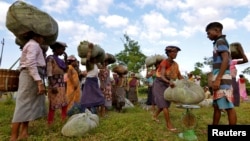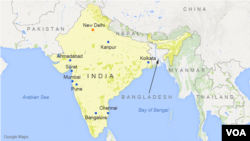A World Bank investigation into a tea plantation project in India that it jointly finances with tea giant Tata Global Beverages has found that it has failed to tackle alleged abuses of impoverished workers, the group said Wednesday.
The International Finance Corporation (IFC), a member of the World Bank Group, said its accountability office began a probe into the project, run by Amalgamated Plantations Private Limited (APPL), after reports tea pickers were being exploited.
In a statement, the IFC said it welcomed the investigation by the Compliance Advisor Ombudsman (CAO) and would work toward improving conditions for workers in plantations in India’s Assam state.
APPL said it was implementing a project focused on areas such as housing, sanitation, medical facilities, health and safety, and worker engagement following an independent assessment into conditions its tea estates in June 2014.
APPL was set up in 2009 to acquire and manage tea plantations previously owned by Tata Global Beverages, which owns Tetley, the second-largest tea brand in the world.
The IFC’s $7.8 million involvement in the $87 million “Tata Tea” project was aimed at promoting shareholder workers and helping to create more than 30,000 permanent jobs.
Tata Global Beverages took a 41 percent stake in APPL and the IFC took 20 percent, with the remainder held by workers and smaller firms.
But complaints by charities and trade unions about exploitation and abuse of tea-pickers — including long working hours, low wages, lack of freedom of association, overexposure to pesticides and poor health and living conditions — prompted the CAO to launch an investigation in February 2014.
The CAO’s findings, released Monday, found the IFC failed to identify and address labor, social and environmental issues, including potential violations of Indian and international law, including those related to housing and wages.
“CAO finds that IFC has not assured itself that the wages paid by the client are consistent with IFC’s commitment to support jobs which offer a ‘way out of poverty’ or ‘protect and promote the health’ of workers,” it said.
The IFC’s investment also supported a problematic employee share-purchase program, the CAO found. It said APPL misrepresented the risks associated with buying stock, resulting in debt incurred by workers who came under pressure to buy shares.
Human Rights Watch called on the IFC to conduct a review of the social impact of its investment and work with its clients to improve the plight of impoverished tea pickers in Assam.






